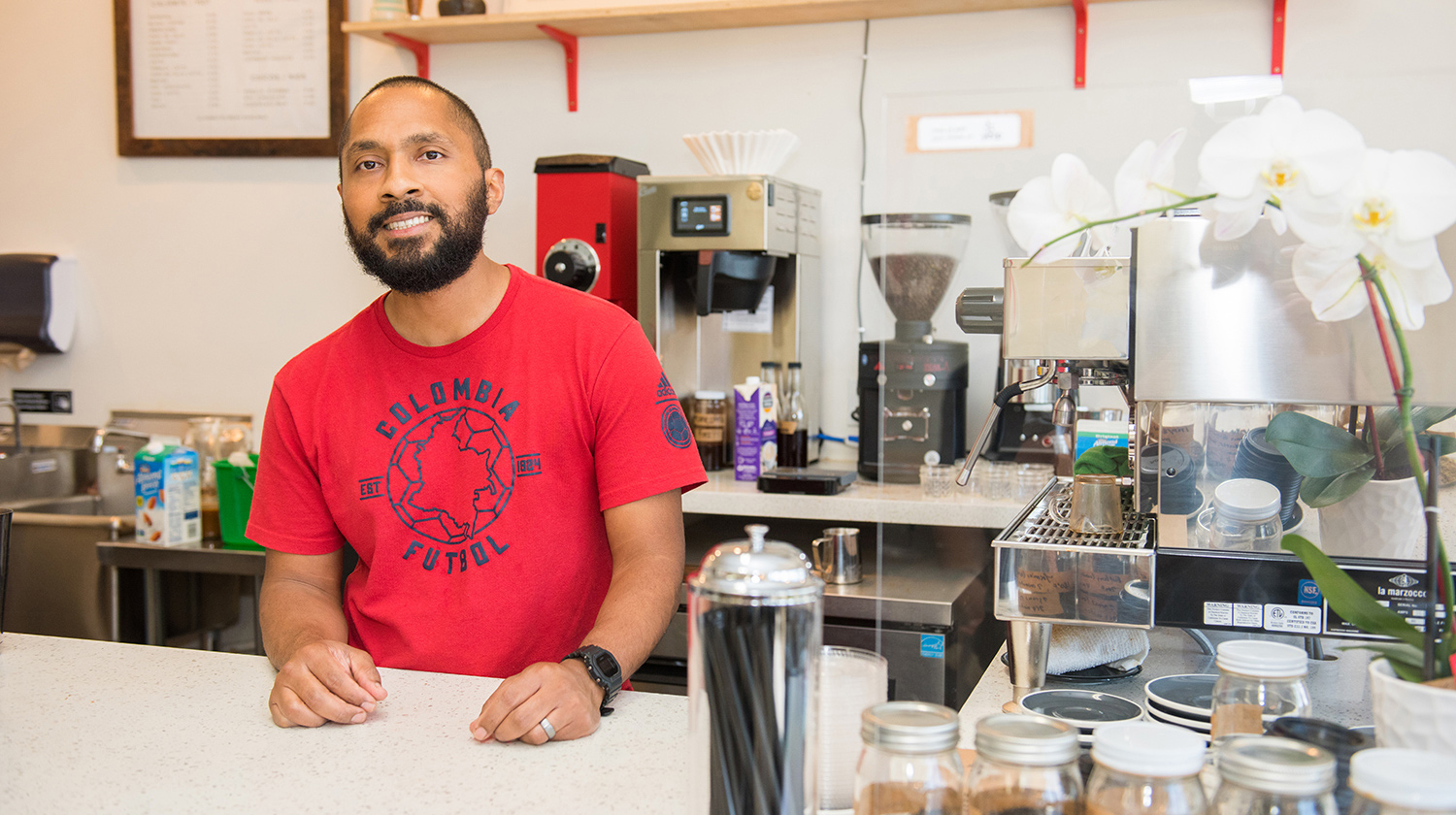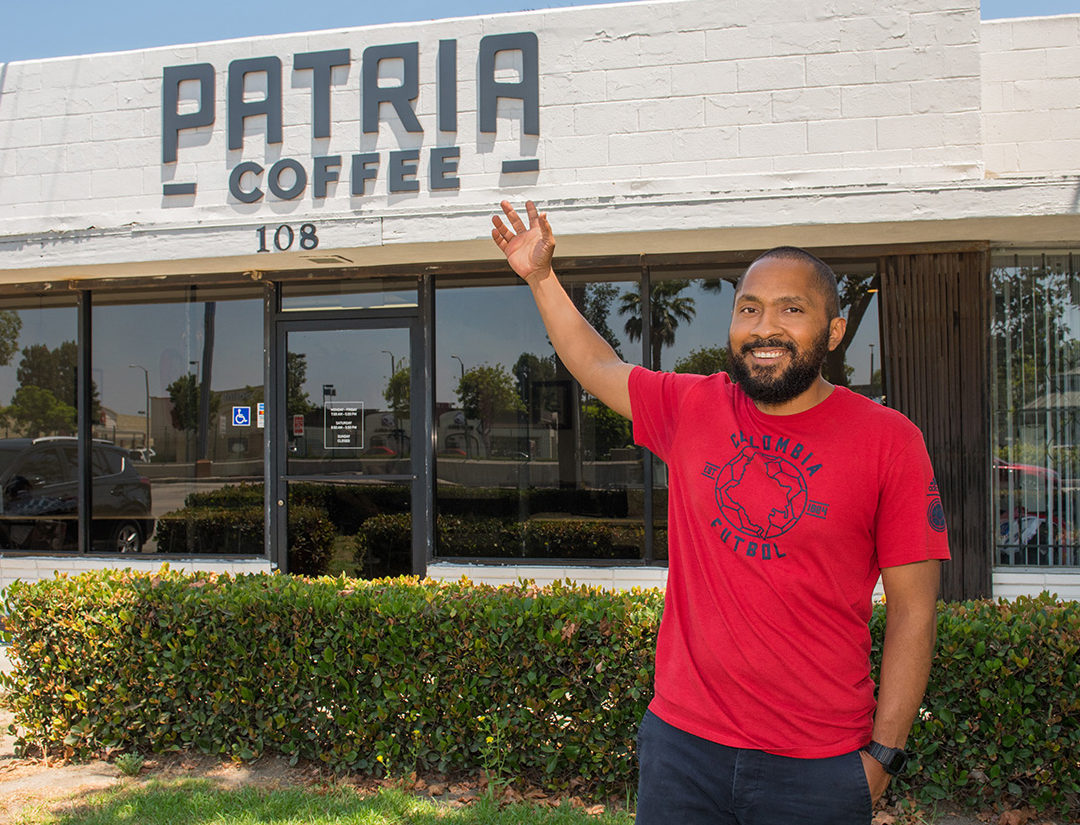
It wasn’t the billowing smoke filling his apartment courtyard from a popcorn machine with a convention oven mounted on top that initially piqued Geoffrey Martinez’s curiosity, it was the smell of freshly roasting coffee beans that drew him in.
“I had never seen coffee roasting before so it definitely caught my attention,” said the California State University, Dominguez Hills (CSUDH) alumnus of the first time he met his neighbor Chris, who had built a makeshift roaster to turn a few pounds of green coffee beans he had bought online into brew-able coffee. “He’s a foody and was trying out different types of coffee and knew that I also liked coffee so we started getting into it. I never got to the point of actually building something like that and smoking up the courtyard, but being introduced to roasting did put me on the path that I’m on today.”
Today, Martinez (’11, B.S., Business Administration, Latin American Studies minor) is the owner of Patria Coffee, a specialty coffee roaster and coffeehouse. Opened in April 2018, the coffee shop is one of a number of new businesses opening in Compton that are helping bring economic vibrancy back to the city.

“We have six employees now and our aim is for the majority of our employees to be hired locally. So far it has been about 50 percent,” said Martinez, who also strives for minimal environmental impact with his business while being active in Compton’s community building initiatives.
Patria Coffee is located at 108 North Alameda Street in Compton. For more information call (310) 243-6746.
After a soft opening and limited hours the first month to train employees and develop the drink menu, Patria is now open six days a week. With just the right mix of minimalism and functionality, both inside and out, Patria enables customers to drop in for a quick cup to go, stay and plug in, and/or hang out in small groups or around the coffee shop’s large and inviting industrial style wood and steel-framed table.
Local patronage is growing thanks to the storefront’s close proximity to the Compton Town Center, a Blue Line station, and the Compton Courthouse. The coffeehouse is also frequented by those who have been following Patria on social media since Martinez first got into roasting in 2011 and started selling coffee bean subscription plans under the Patria name.
“I started roasting coffee and selling it to friends and family,” said Martinez, of those early days. At the time, he was finishing his degree at CSUDH, taking classes part-time at night while working as an electronics exporter. “Then I started getting small accounts in offices, restaurants, and churches. Most of that happened through word-of-mouth.”
He eventually quit his job to focus on his entrepreneurial venture and take care of his child full time.
“My time at Cal State Dominguez hills was great. We were encouraged to explore the richness of our cultural heritage and celebrate it. There were a lot of opportunities for me there,” he said. “It really takes some grit to work full-time and go to classes when your brain feels fried. Somehow, you figure out how to pass classes and study for tests, then graduate to move your life forward. Next to opening Patria it was the hardest thing I have done in my life, but well worth it.”
Martinez’s passion for coffee roasting may have developed from that chance encounter with his neighbor, but its origins can be traced to his childhood. A Los Angeles native born to immigrant parents from Guatemala, Martinez returned to the country and spent his early childhood in the rural coastal region of Escuintla where he discovered coffee in its fruit form while playing in his friend’s backyard. He also learned about campesinos, the tenant farmers who for generations have produced much of Guatemala’s coffee. He also experienced the environmental damage modern agriculture can cause for the farmers.
“The coffee we source is organically certified either by Fair Trade Organic or the Rainforest Alliance,” said Martinez. “For me, sustainably grown means that there have been efforts made for minimal environmental contamination. It doesn’t make it perfect by any means, and is not a cure for all evils, but it creates consciousness for the consumer about the people behind the coffee. It’s important to know that it’s not just a commodity, it’s a livelihood for many people.”